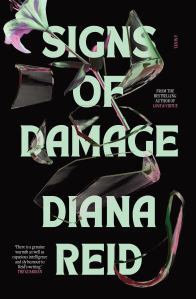Book Review: Signs of Damage by Diana Reid
The Kelly family’s idyllic holiday in the south of France is disturbed when Cass, a thirteen-year-old girl, goes missing. She’s discovered several hours later with no visible signs of injury. Everyone present dismisses the incident as a close brush with tragedy.
Sixteen years later, at a funeral for a member of the Kelly family, Cass collapses. The present and the past start to collide as buried secrets come to light and old doubts resurface. What really happened to Cass in the south of France? And what’s wrong with her now?
A gripping tale of unravelling memories and moral ambiguities, Signs of Damage wrestles with the difference between understanding other people and trying to explain them.
Released March 2025
 My Thoughts:
My Thoughts:Signs of Damage is the latest release by the very talented Diana Reid, and once again, she has returned with something very different. No two novels are ever the same from her, each new release entirely fresh and vibrant in style, character, and theme.
In Signs of Damage, Diana Reid explores the parameters of subjectivity within the context of personal stories and the way humans invariably tend to shape a narrative to their own needs.
‘We all defer to familiar narratives: we see someone’s present suffering and immediately wonder what buried trauma is being expressed.’ – Author note.
The story unfolds over the course of a week as a dual timeline, 2008 and 2024. The perspectives alternate through both timelines between members of the Kelly family, along with Cass, Sam, and Harry, entwined as they are in each other’s lives. Much of the story is focused on Cass and the seizures she has been experiencing in the present day. Are they caused by physiological or psychological factors? Did something happen to her during that week in 2008 that was repressed and is now manifesting as seizures sixteen years on?
I liked Cass, and I particularly liked her reluctance to pin the cause of her seizures on a traumatic event. I feel as though everyone is constantly grasping at trauma to explain who they are and why they are, and sometimes, there are occasions when things just happen to people.
The story orbits around a tragedy that is revealed in the opening pages and then moves back through time to arrive back at that point. I enjoyed the narrative style and found it easy to devour this one, particularly as it was broken up into the days of the week.
Read for book club, I am keen to see what the others thought of this one. The ending was suitably anticlimactic, but I expect some readers may have wanted more of a bang to the finish. Overall, I enjoyed Signs of Damage immensely and look forward to whatever Diana Reid chooses to bring us next.



